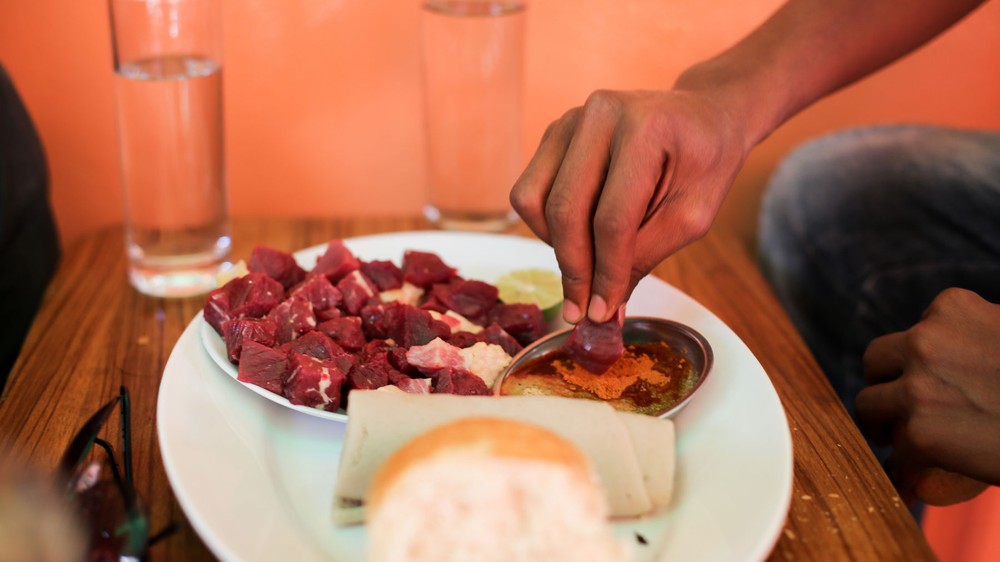Ethiopia is full of culinary surprises. Come to think about it. How does fresh raw meat taste?
While many do not comprehend how this is possible, eating raw meat in Ethiopia is a thing. Mutton, beef makes up the popular dish.
It is part of their national heritage embraced and loved beyond human comprehension. Interestingly, there is a history behind it all, coupled with their innate friendly nature.
For first-timers visiting Ethiopia, it is intriguing when you find people dining on raw meat. However, the intrigues don’t last long because they welcome you, explain the tradition behind it all and offer you a “taste trial”.
It is hard when you are not used to it. It takes some time to get used to the idea of feasting on uncooked meat. But, it tastes different, especially with pepper sauce by the side.

Ethiopian Raw Meat delicacy. [Photo: Lipstick Alley]
Table of Contents
So, What’s Behind Eating Raw Meat In Ethiopia?
Walking into a butchery in Ethiopia – meat selling spots are known as butcheries in Africa – you find groups of people enjoying their meal. The meat points sell fresh lamb, sheep, and bull meat. It is upon you to order what you feel is right for you.
The serving comes straight from the butcher. It is indifferent quantities; a kilogram or more. Sometimes, people will order half a kilo. It all depends on the budget you have and how many people you are.
Nonetheless, the raw fresh meat serving comes in a circular metallic tray with a sauce bowl for dipping. It gives more flavor to the meat. The sauce has spicy flavors to rock your taste buds. Each tray comes with knives to chop it into fine pieces as you enjoy your meal.
When Is Raw Meat Eaten In Ethiopia?
Every day is a meat-eating day in Ethiopia. Saturday and Sunday are the peak days for raw meat-eating in Ethiopia. Wednesday and Friday are fasting days; no one eats raw meat. Also, during some traditional holidays, raw meat is off bounds. But, such holidays are just a few in a year.
What Is The History Behind Ethiopia’s Raw Meat?
Interestingly, raw meat-eating in Ethiopia dates back to 3000 years back. History has it that Ethiopians started eating raw meat to evade colonization by Italians who invaded their land thousands of centuries ago.
They couldn’t cook the meat because lighting fire to prepare it could blow their cover against their enemies – Italians. Thus, they took it raw.
The traditions are deeply rooted in the communities and carry a sentimental value for Ethiopians. It is a sign of honor for the ancestors, and the culture is passed from one generation to another.
How Much Does Raw Meat Cost In Ethiopia?
A raw meat dish is one of the most expensive dishes in Addis Ababa. It is served with Ethiopia’s signature food Injera. Injera is specially prepared with wheat flour and an Ethiopian touch making it an authentically Ethiopian dish. Across Addis Ababa, you will find it as an accompaniment.
You Still Can Enjoy Cooked Meat
Although raw meat-eating is popular, you still can enjoy a dish of well-cooked beef or mutton christened ‘chocolate tips.’ Another surprise shocks you.
A mini-clay oven is placed on the table with a clay pot on it. Beneath, hot charcoal cooks the meat slowly and keeps it hot throughout as you enjoy the meal. The spices used in preparing it are as tasty as Ethiopian cuisine.
Science cites that eating raw meat is harmful to the body. You are likely to suffer from Brucellosis. However, Ethiopians say this is not the case. For them, raw meat is a healthy option.








